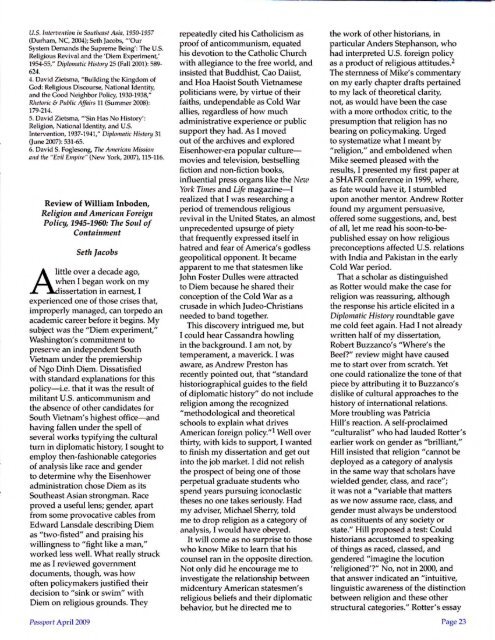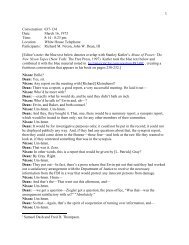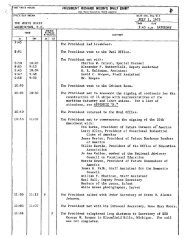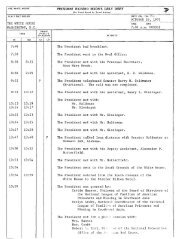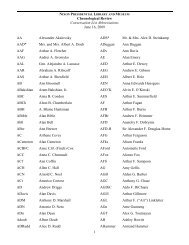Here - Nixon Tapes
Here - Nixon Tapes
Here - Nixon Tapes
- No tags were found...
You also want an ePaper? Increase the reach of your titles
YUMPU automatically turns print PDFs into web optimized ePapers that Google loves.
U.S. htetw tio,t i Southcnsl Asid,195F1957 repeatedly cited his Catholicism as(DuAam, NC, 2004); Seth Jacobs, "'Our proof of anticommunism, equatedSystem Demands the Supr"me BeinS': The U.S.Religious Revival and the'Diem Experiment' his devotion to the Catholic Churchlg*fi," Diplonntic HEtory 5 (Fall 2001):589- with allegiance to the free world, and624.insisted that Buddhist, Cao Daiist,4. David Ziebma, 'Buildint the Kintdom of and Hoa Haoist South Vietnamesefu: Reli8ious Discourse, Nationaldentity,and thc Good Neighbor Policy, 193&1938," politicians were, by virtue of theirRl/E,oric & Pu ic Afnirs ll (Summer 2008): faithg undependable as Cold War179-214.allies, regardless of how much5. David Zietsma, "'Sin Has No Hisbory': administrativexperience or publicReliSioD Nationaldentity, and U.S.Intervention, l93T-1941,' Diplonn,ic History 3l support they had, As I movedoune 2m7): 531 -55.out of the archives and explored6. David S. Fogfesong Thc A,,1,cricd[ Missiotl Eisenhower-era popular culturcmoviesand television, bestsellingoud the "Evil E,ntin'(New York 2007),115-116.fiction and non-fiction books,influential prcss organs like the NauYo* Thnes and Life magazine-lReview of William Inboden,rcalized that I was rcsearching aperiodReligion and American Foreignof tremendous religiousPolicy,79t15-7960: Therevival in the United States, an almostSoul ofContainmentunprecedented upsuqge of pietythat frequently expressed itself inSethhatr€d and fear of America's godlesslacobsgeopolitical opponent. It becamelittle over a decade ato,apparento me that statesmen likewhen I began work on my lohn Foster Dulles were attractedissertationto Diemin eamest, Ibecause he sharcd theirexperienced one of those crises that,conceotion of the Cold War as aimproperly managed,crusade in whichcan torpedo anJudeo{hrisHansneededacademic career before it begins. Myto band totether.subiect was the "Diem experiment "This discovery intrigued me, butIWashin$on's commiknent tocould hear Cassandra howlingpreserve an independentin the background. I am not, bySouthVietnam under the premiershiptemperament, a maverick. Iwasof Ngo Dinh Diem. Dissatisfiedaware, as Andrew Preston haswithr€c€ntly pointedstandard explanations for thisout, that "standardpolicy-i.e, that it was the result ofhistoriographical guides to the fieldof diplomatic history" do not includemilitant U.S. anticommunism andreligionthe absence of other candidates foramong the recognizedSouth Vietnam's highest"methodological and theoreticaloffi ce--andhaving fallen under the spell ofschools to explain what drivesseveral works typifying theAmerican foreign policy."r Well overculturalthirty, with kids totum in diplomatic history I soughtosupport, I wantedemploy then-fashionableto finish my dissertation and get outcategoriesof analysis like race and genderinto the iob market. I did not relishto determine why the Eisenhowerthe prospect of being one of thoseperpetual graduate students whoadministration chose Diem as itsSoutheast Asian strongman. Racespend years pursuing iconoclasticproved a useful lens; gender,theses no one takes seriously. Hadapartmyfrom some provocative cables fromadviser, Michael Sherry, toldme to drop religion as a category ofEdward Lansdale describing Diemanalysis, I would have obeyed.as "two-fisted" and praising hiswillingness to "fight like a man,"It will come as no surpris€ to thosewho know Mike to learn that hisworked less well. What really struckme as I reviewed governmentcounsel ran in the opposite dircction.Not only did he encourage me todocuments, though, was howinvestigate the relationshi p betweenoften policymaker iustified theirdecision to "sink or swim" withmidcenturv American statesmen'sreligiousDiem on religious grounds. Theybeliefs and their diplomaticbehavior, but he directed me toPdssport April 2009the work of other historians, inparticular Anders Stephansory whohad interpreted U.S. foreign policyas a prcduct of rcligious attitudes.2The sternness of Mike's commentarvon my early chapter drafts pertainedto my lack of theoretical clarity,not, as would have been the casewith a more orthodox critic, to thepresumption that religion has nobearing on policymaking. Urgedto systematize what I meant by"religiorl" and emboldened whenMike seemed pleased with theresultt I pres€nted my first paper ata SHAFR confurence in 1999, where,as fate would have it, I stumbledupon another mentor. Andrew Rotterfound my argument persuasive,offercd some suggestionq an4 bestof all, let me read his soon-to-bepublishedessay on how religiouspreconceptions affected u.s. rclationswith India and Pakistan in the earlvCold War period.That a scholar as distinguishedas Rotter would make the case forreligion was reassuring althoughthe response his article elicited in aDiplomatic History roundtable gaveme cold feet again. Had I not alreadywritten half of my dissertatiooRobert Buzzanco's "Wherc's theBeef?" review might have causedme to start over from scratch. Yetone could rationalize the tone of thatpiec€ by attributing it to Buzzanco'sdislike of cultural approaches to thehistory of international relations.More troubling was PatriciaHill's reaction. A self-proclaimed"culturalist'' who had lauded Rofter'searlier work on gender as "brilliant"Hill insisted that religion "cannot bedeployed as a category of analysisin the same way that scholars havewielded gender, class, and race";it was not a "variable that mattersas we now assume race, class, andgender must always be understoodas constituents of any society orstate." Hill propooed a test Couldhistorians accustomed to speakingof things as raced, classed, andgendered "imagine the loc,ution'religioned'?" No, not in 2000, andthat answer indicated an "intuitive,linguistic awareness of the distinctionbetween rcligion and these otherskuctural categories." Rotter's essayPagc 23


